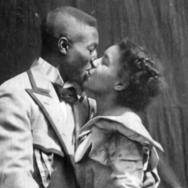Six months ago, a 29-second silent film captured the public imagination, sparking passionate responses from director Barry Jenkins, actress Viola Davis and other Hollywood stars and black celebrities. As the earliest-known depiction of African American affection, Something Good-Negro Kiss was inducted into the Library of Congress’ National Film Registry—preserving the images of two black performers joyfully kissing and holding hands.
Now, the University of Chicago scholar who identified and dated the 1898 film has been honored by the Academy of Motion Picture Arts and Sciences.
Allyson Nadia Field has been named an Academy Film Scholar, a program founded in 2001 to promote film scholarship. An associate professor in UChicago’s Department of Cinema and Media Studies, Field will receive a $25,000 grant to support a new book, Minstrelsy-Vaudeville-Cinema: American Popular Culture and Racialized Performance in Early Film.
“This book is an attempt to reconsider the history of early American film with a fuller understanding of the ways that minstrelsy informed early filmmaking, screen performance and cinema audiences,” Field said.
Field first saw scans of Something Good-Negro Kiss in January 2017. University of Southern California film archivist Dino Everett had acquired the 19th-century nitrate print from a collector, and enlisted Field to help identify its origins and significance. By examining material evidence on the nitrate print, as well as inventory and distribution catalogs, Field traced the film to William Selig’s studio in Chicago. With help from the Museum of Modern Art, she identified the performers as Saint Suttle and Gertie Brown, two well-known minstrel performers who toured the country but were based in Chicago.
Despite its brevity, Field said, Something Good-Negro Kiss prompts a “radical rethinking of early cinema.” As a late 19th-century artifact, the film not only adds to scholarly understanding, but stands out as a rare positive and naturalistic representation of African American life during a period replete with racist stereotypes.
“My work draws on these new archival discoveries to open up our sense of how race entered into and was used by films of the time,” Field said, “and to likewise see how moving pictures could offer a terrain of possibilities for resistance to racist representation.”
Field is also the author of Uplift Cinema: The Emergence of African American Film & The Possibility of Black Modernity, which drew from rare archival materials to explore how black filmmakers used cinema as a mode of civic engagement in the 1910s.
She was named a 2019 Academy Film Scholar alongside Mindy Johnson, a filmmaker and author who has written extensively about the history of animation. Johnson will use her grant to support a new book, Women Who Transformed Our Animated Past.
“Field and Johnson’s research will shed new light on the history of the film industry through two distinct lenses,” said Marcus Hu, chair of the Academy’s Grants Committee. “This committee is honored to support them, and we look forward to seeing how their work impacts our historical understanding and appreciation of motion pictures for generations to come.”
Field is the first person to be named an Academy Film Scholar as a UChicago faculty member. D. N. Rodowick won the grant in 2002, and joined UChicago in 2013 as the Glen A. Lloyd Distinguished Service Professor in Cinema and Media Studies.











 —Prof. Kunle Odunsi
—Prof. Kunle Odunsi
